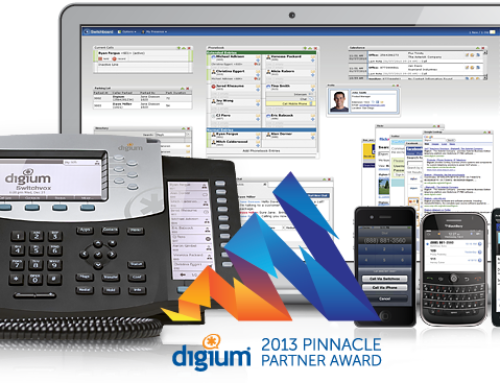For many years, analog telephone systems were the main way businesses stayed connected, but these systems are simply too inefficient and outdated to meet the needs of today’s businesses. What modern companies require is a fast, flexible, and inexpensive way to communicate with their staff, customers, and the broader world. No technology best accommodates these needs quite like Voice over Internet Protocol (VoIP) phone systems.
What is VoIP?
VoIP is a technology that uses the internet rather than traditional telephone lines to make and receive calls. VoIP converts audio signals into data packets that are then transmitted over a network. Well-known VoIP services providers include Digium, Nextiva, and RingCentral.
What are the benefits of VoIP?
VoIP phone systems offer businesses a wide range of benefits that traditional phone systems simply cannot match, such as:
1. Significant cost savings
Unlike traditional phones, VoIP technology is incredibly cost-effective. For one, VoIP transmits calls over your broadband connection the same way data is transmitted, whereas traditional phone systems require you to pay for a dedicated phone line. This means you pay your internet service provider only for the bandwidth you need for calls without expensive phone charges tacked on. In fact, VoIP call rates — including long-distance and international calls — are much lower than landlines’ because it is relatively inexpensive to transmit voice data over the internet.
What’s more, VoIP dramatically reduces hardware costs. Analog phone systems require users to purchase private branch exchange switches and landlines that can cost as much as $2,000 upfront per user. That doesn’t even include the cost of setting up copper wiring for phone lines, installation fees, and long-term maintenance contracts with telephone companies, all of which can add up quickly.
In contrast, VoIP phone systems forego much of the hardware and setup costs associated with traditional phones for an entirely digital option. To operate VoIP, you only need a reliable internet connection and any computer or mobile device that can run VoIP software. Everything from setup, updates, and maintenance is taken care of by your VoIP service provider for a low monthly subscription fee, so you don’t have to worry about any additional costs. You can even purchase additional peripherals, such as headsets and IP phones, but these costs are minimal compared to old-fashioned landlines.
2. Flexible communications
VoIP unshackles business communications and empowers remote workers. Instead of confining you to one physical phone line, VoIP allows you to make and receive calls with any device connected to the internet. VoIP software also routes incoming calls to your preferred devices, whether it’s a desktop or laptop computer, smartphone, or IP phone, so you never have to worry about missing an important call. If you are unable to take a call, VoIP systems can automatically transfer it to the next person in the chain or send voicemails directly to your email inbox.
3. Robust phone features
VoIP systems offer a suite of professional features that can help businesses boost efficiency. From the outset, you get access to:
- Call forwarding – redirects callers to an alternate phone number or extension when the intended recipient is currently unavailable
- Call screening – displays caller information like names, phone numbers, and purpose for calling, so you can decide whether to answer or not
- Call recording – records call audio for future reference or training purposes
- Call monitoring – allows administrators to listen in on live calls for quality assurance and service agent coaching
- Call conferencing – connects multiple callers on a single line for audio and video group conversations
- Call queuing – directs incoming calls to a waiting queue and automatically connects them with the next available customer service representative
- Voicemail transcription – converts voicemails into text for quick and easy reference
4. Virtual receptionist
Organizations usually hire a receptionist to handle incoming calls and direct callers to the appropriate personnel, but this isn’t always feasible for companies with limited resources. What’s worse is that when there’s a large volume of calls, a single receptionist may not be enough to handle the influx.
VoIP digitizes and streamlines these administrative tasks. Automated attendant features, in particular, can be used to route incoming calls to the right department and guide callers through an interactive menu so they don’t have to wait for a live representative. For better accessibility, interactive voice response features enable callers to ask questions and navigate computer-operated support desks using voice commands.
5. Crystal clear calls
VoIP technology has come a long way in terms of call quality. Thanks to affordable high-speed internet, VoIP calls are now just as clear and reliable as traditional landlines. VoIP systems even have quality of service protocols that can prioritize voice and video data over other forms of traffic, ensuring you get HD-quality calls from start to finish. Additionally, VoIP now has advanced audio compression and noise cancellation features, so users can focus on the conversation.
6. Scalable phone system
VoIP can be easily scaled up or down to accommodate your telephony needs. Since VoIP runs on software and cloud platforms, adding or removing users and phone lines from your system can be done with just a click of a button. You don’t have to worry about wiring limitations or new hardware; you can simply request an upgrade or downgrade from your VoIP provider and they’ll take care of all the background infrastructure work.
7. Integration with existing systems
Integrating VoIP with corporate applications like customer relationship management (CRM) platforms and business intelligence software gives your business an edge. When combined with CRM tools, VoIP can provide a more seamless customer service experience by displaying caller information as soon as the call is answered. The information can detail the caller’s past interactions with your company along with their purchase history, giving your sales or support team more insight into their customer’s needs.
Meanwhile, pairing VoIP with analytics software makes it easy to monitor important call-related metrics. For instance, you can track average handle time, customer demographics, wait times, satisfaction ratings, and more. This data can be used to measure service performance, spot trends, and optimize customer service strategies.
VoIP is truly a powerful technology that can help businesses succeed. With its array of features and advantages, VoIP has become a must-have for many companies. If you want to experience the benefits of VoIP but don’t know how to implement this technology, leave it to Dynamic Solutions Group. Our team of experts can help you procure, set up, and optimize a VoIP system that works for your business. Contact us now to enjoy superior communication solutions.






